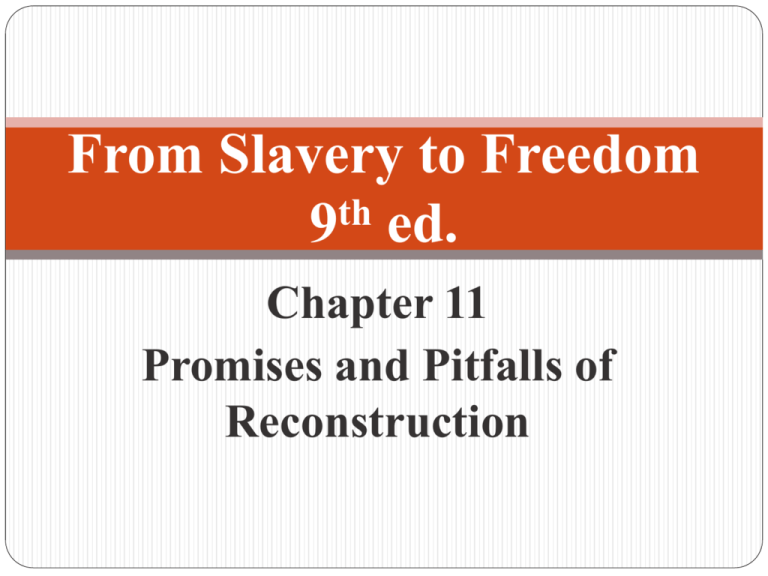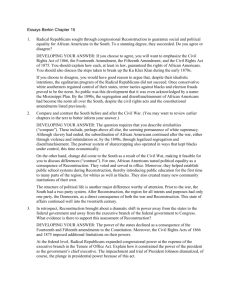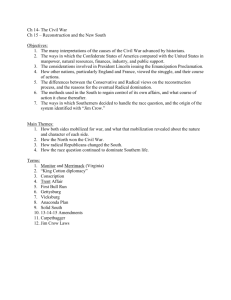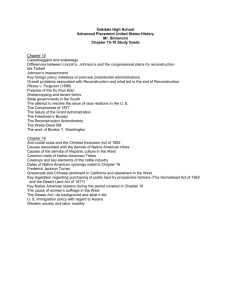
From Slavery to Freedom
th
9 ed.
Chapter 11
Promises and Pitfalls of
Reconstruction
Enfranchisement of
African Americans
2
© 2010 The McGraw-Hill Companies, Inc. All Rights Reserved.
Presidential Reconstruction
Lincoln’s Ten Percent Plan
Conflict between President and Congress over
who was to set conditions of South’s readmission
Lincoln’s plan allowed states to be readmitted if one-
tenth of eligible voters swore loyalty to the U.S. and
accepted abolition of slavery; gave general amnesty to
certain high-ranking civil and military officers
Criticized by some members of Congress as too lenient
Also disagreed over status of freedpeople
3
© 2010 The McGraw-Hill Companies, Inc. All Rights Reserved.
Presidential Reconstruction
Andrew Johnson’s Policies
Conflict between two branches continued after
Andrew Johnson became president
Johnson wanted to leave black suffrage up to the
states and began to dictate Reconstruction policy
Extended general amnesty; seen as a champion
of the South
4
Black Codes
Southern states began to pass laws that curbed
black freedom and bore resemblance to the Slave
Codes © 2010 The McGraw-Hill Companies, Inc. All Rights Reserved.
Presidential Reconstruction
In 1865, the South elected many Confederate
leaders to represent them in Congress
Republicans under Thaddeus Stevens argued that
Congress should take over Reconstruction
Joint Committee on Reconstruction
Congress Takes Charge
Conditions for freedpeople terrible; southern
whites waging a kind of guerilla warfare on
blacks
5
© 2010 The McGraw-Hill Companies, Inc. All Rights Reserved.
Selling a freedman to pay his fine at
Monticello, Florida
6
© 2010 The McGraw-Hill Companies, Inc. All Rights Reserved.
Presidential Reconstruction
1866, Congress passed Civil Rights Act over
Johnson’s veto
Gave federal statutory protection against the Black
Codes
Different northern interests began to promote the
enfranchisement of black men
Fight between Congress and President continued
Johnson eventually repudiated at polls because
of his conduct
“Swing around the circle”
7
© 2010 The McGraw-Hill Companies, Inc. All Rights Reserved.
Presidential Reconstruction
The Black Conventions
Blacks politically mobilized against presidential
Reconstruction
Statewide conventions in South convened in 1865-6
Demanded “Equal Rights before the Law”
Black Mobilization
Churches and fraternal societies provided
infrastructure for political activism in southern
cities
Mobilization more advanced in places where
federal troops remained the longest
8
© 2010 The McGraw-Hill Companies, Inc. All Rights Reserved.
Radical Reconstruction
Radical Reconstruction
Reconstruction Act of 1867
Ex-Confederate states divided into five military
districts under martial law
Each state required to hold a constitutional convention
based on universal male suffrage
All states required to ratify the Fourteenth Amendment
before admittance
9
Some condemned gendered language; fought for universal
suffrage
© 2010 The McGraw-Hill Companies, Inc. All Rights Reserved.
Radical Reconstruction
New National Officials
Fifteenth Amendment extended suffrage to black
men creating a black electorate in the former
Confederacy
Two African Americans sent to the U.S. Senate
Hiram Revels
Blanche K. Bruce
Twenty blacks served in the U.S. House between
1877 and 1901
10
© 2010 The McGraw-Hill Companies, Inc. All Rights Reserved.
The first black senators and representatives, in the FortyFirst and Forty-Second Congress of the United States
11
© 2010 The McGraw-Hill Companies, Inc. All Rights Reserved.
Radical Reconstruction
Blacks as State Legislators
Blacks served with varying success as state
legislators
Wielded greatest influence in South Carolina
The Union League
Became spearhead for Southern Republicanism
during Reconstruction
Depended on black men for bulk of Republican
strength
12
© 2010 The McGraw-Hill Companies, Inc. All Rights Reserved.
Radical Reconstruction
Black Women and the Black Community
Black women active in “getting out the vote” and
vocal in political discussion
Civil Rights Act of 1875 clarified rights of
African Americans to freely use public
accommodations
Declared unconstitutional in 1883
13
© 2010 The McGraw-Hill Companies, Inc. All Rights Reserved.
Robert Brown Elliott speaking before Congress
14
© 2010 The McGraw-Hill Companies, Inc. All Rights Reserved.
The Social Consequences of the War
The Freedmen’s Bureau
Responsible for relief and rehabilitation
programs for the newly emancipated
Provided food and medical services, established
schools, supervised contracts, managed land
First large-scale federal welfare program
The Pivotal Role of Education
Most saw education as key
Bureau worked with private northern institutions
and established black educators
15
© 2010 The McGraw-Hill Companies, Inc. All Rights Reserved.
The Social Consequences of the War
Educators, Black and White
Teachers came from North; many were
missionaries; number of black teachers steadily
increased
By 1870, task of education completely
transferred to local communities and religious
organizations
Black Churches
Offered spiritual and material relief
First social institutions fully controlled by blacks
16
© 2010 The McGraw-Hill Companies, Inc. All Rights Reserved.
Economic Adjustment
The Desire for Land
Ex-slaves resisted signing labor contracts,
fearing a new form of enslavement
Saw landownership as a source of economic
independence; landownership considered more
favorable than wage labor
Southern Homestead Act of 1866
Blacks still prevented from landownership by white
hostility
By 1870s, many abandoned landownership dreams to
move to urban centers
17
© 2010 The McGraw-Hill Companies, Inc. All Rights Reserved.
Economic Adjustment
Women in the Labor Market
Attempt to withdraw black females and children
from labor market had economic consequences
Contributed to decline in per capita production
Black males took on new assertive role as
representatives of their families
Evidenced by the gender differences in dealings with
Freedmen’s Bureau
Many whites did not think black women should
have same fashion and leisure styles as whites
Lambasted if wore fashionable attire
18
© 2010 The McGraw-Hill Companies, Inc. All Rights Reserved.
Economic Adjustment
Majority of black women, however, worked,
primarily in the fields
Changing Conditions of Farm Labor
Blacks resisted conditions placed on agricultural
workers
Overall per capita labor hours reduced by
one-third
Incentives and flexibility were provided to
blacks to meet urgent labor needs
19
© 2010 The McGraw-Hill Companies, Inc. All Rights Reserved.
Upland Cotton
20
© 2010 The McGraw-Hill Companies, Inc. All Rights Reserved.
Economic Adjustment
Sharecropping
Sharecropping a “compromise” between
planters’ need for stability and control over
agricultural production and freedpeoples’ need
for less risk in economic compensation
Flawed system; most sharecroppers assumed
great debt due to cost of maintenance
Under this system, white South recovered more
quickly than freed blacks
21
© 2010 The McGraw-Hill Companies, Inc. All Rights Reserved.
Economic Adjustment
The Freedmen’s Bank
Chartered by federal government for use by
blacks; encouraged blacks to save money
Some of its financiers acted unscrupulously
Frederick Douglass unable to save it; closed in
1874
22
© 2010 The McGraw-Hill Companies, Inc. All Rights Reserved.
Reconstruction’s End
Reconstruction’s End
Democratic party revived in South after general
amnesty given to most ex-Confederates
The Reign of Violence
White supremacist secret societies grew
Used legal and extra-legal means to deny blacks
equality
Camelias and Klan most powerful; used violent
means to stop blacks from participating in
politics
23
© 2010 The McGraw-Hill Companies, Inc. All Rights Reserved.
Reconstruction’s End
Efforts to outlaw organizations and stop the
violence were unsuccessful
Societies had success in influencing politics
Mississippi
Louisiana
South Carolina
Despite black defiance to the intimidation, blacks
began to stay at home and political power shifted
to the Democrats
24
© 2010 The McGraw-Hill Companies, Inc. All Rights Reserved.
Reconstruction’s End
Corruption in Republican Governments
Republican corruption hastened end of Radical
Reconstruction
Following deaths of old antislavery leaders,
Republican Party headed in new direction
Supreme Court Decisions
1875 Supreme Court decisions weakened black
voting rights
United States v. Cruikshank
United States v. Reese
25
© 2010 The McGraw-Hill Companies, Inc. All Rights Reserved.
Reconstruction’s End
The Campaign of 1876
Controversy over who won 1876 election led to
formation of commission charged with deciding
the presidency
To break impasse, Republicans promised to
withdraw troops; assist South with obtaining
federal subsidies; and allow for better
representation in Washington
Rutherford B. Hayes declared winner
Withdrew federal troops while Congress removed
other restrictions
26
© 2010 The McGraw-Hill Companies, Inc. All Rights Reserved.






